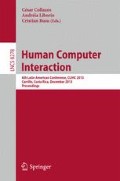Abstract
User experience (UX) refers to the feelings people have when interacting with a product or service. UX design aims to enable certain experience through the development and testing of prototypes, therefore methods are needed to capture and evaluate user experience at different stages of use. Experience Sampling Method has been used to capture user experience on a moment-to-moment basis and in the context they are elicited. One mayor drawback of this method is the high load on participants, which often results in lowering participation in the study. Based on a literature review on motivational theory two design concepts are presented to illustrate how different motivators could influence different qualities of participation. Initial explorations of these concepts address opportunities and challenges of motivational mechanisms in the development of UX design and research methods.
Access this chapter
Tax calculation will be finalised at checkout
Purchases are for personal use only
Preview
Unable to display preview. Download preview PDF.
References
Larson, R., Csikszentmihalyi, M.: The Experience Sampling Method. New Directions for Methodology of Social and Behavioral Science 15, 41–56 (1983)
Roto, V., Law, E., Vermeeren, A., Hoonhout, J.: User Experience White Paper. Dagstuhl Seminar on Demarcating User Experience, Germany (2011), http://www.allaboutux.org/files/UX-WhitePaper.pdf
Scollon, C., Kim Prieto, C., Diener, E.: Experience Sampling: Promises and Pitfalls, Strengths and Weaknesses. Journal of Happiness Studies 4, 5–34 (2003)
Vastenburg, M.H., Romero Herrera, N.A.: Experience Tags: Enriching Sensor Data in an Awareness Display for Family Caregivers. In: Keyson, D.V., et al. (eds.) AmI 2011. LNCS, vol. 7040, pp. 285–289. Springer, Heidelberg (2011)
Jimenez Garcia, J.C., Romero, N., Keyson, D.: Capturing patients daily life experiences after Total Hip Replacement. In: 5th International Conference on Pervasive Computing Technologies for Healthcare and Workshops, pp. 226–229. IEEE (2011)
Rogers, Y.: Interaction design gone wild: Striving for wild theory. Interactions 18(4), 58–62 (2011)
Author information
Authors and Affiliations
Editor information
Editors and Affiliations
Rights and permissions
Copyright information
© 2013 Springer International Publishing Switzerland
About this paper
Cite this paper
Rek, M., Romero, N., van Boeijen, A. (2013). Motivation to Self-report: Capturing User Experiences in Field Studies. In: Collazos, C., Liborio, A., Rusu, C. (eds) Human Computer Interaction. CLIHC 2013. Lecture Notes in Computer Science, vol 8278. Springer, Cham. https://doi.org/10.1007/978-3-319-03068-5_19
Download citation
DOI: https://doi.org/10.1007/978-3-319-03068-5_19
Publisher Name: Springer, Cham
Print ISBN: 978-3-319-03067-8
Online ISBN: 978-3-319-03068-5
eBook Packages: Computer ScienceComputer Science (R0)

